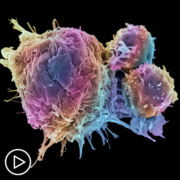Understanding the Basics of CAR T-Cell Therapy
Understanding the Basics of CAR T-Cell Therapy from Patient Empowerment Network on Vimeo.
CAR T-cell therapy is an exciting new option to treat multiple myeloma, but what patient type is this therapy right for? Expert Dr. Shambavi Richard defines CAR T-cell therapy and explains the eligibility requirements.
Dr. Shambavi Richard is Co-Lead Physician for the Myeloma CAR-T Programs at Mount Sinai Tisch Cancer Center. Learn more about Dr. Richard.
See More from The Care Partner Toolkit: CAR T-Cell Therapy
Related Resources:

|

|

|
Transcript:
Katherine:
Let’s begin with the basics of CAR T-cell therapy. What is it? And maybe, actually, we could start with what CAR is short for.
Dr. Richard:
So, CAR stands for chimeric antigen receptors, so CAR T cell is a chimeric antigen receptor T-cell therapy. What that means is T cells, which is one of the cells for immune system are actually come from the patient. They’re expanded and activated in a manufacturing facility. And there they undergo genetic modification to form the CAR T cells. And what’s special about the CAR T cells is that they have the capacity to recognize myeloma cells and are efficient killers of the myeloma cells.
Katherine:
Who might this approach be right for? What determines eligibility?
Dr. Richard:
So, interestingly enough, today as we speak, CAR T cells may be eligible for many, many different kinds of – in the phases, many different phases of the myeloma journey. When they were initially tested, as most new therapies are, they were tested on patients who had very advanced myeloma, really were not candidates or did not have great options for any other kinds of therapy. And when they got tested in these groups of patients, they really had stellar results that far outstripped anything else that we had as options for patients in those advanced stages of myeloma.
So, the approval for CAR T cells as they stand today for myeloma is for advanced myeloma with patients who have had four or more lines of therapy and have had exposure to pretty much the major three classes of therapies for myeloma which includes proteasome inhibitors, imides, and anti-CD38 antibody therapy.
But having said that, now CAR T cells are being moved into earlier lines of therapy are now being tested in these in various clinical trials. And even for newly diagnosed myeloma patients to see if they are as good as autologous transplants. Are they better than autologous transplants? And so on and so forth. So, really that’s what I mean by saying for now CAR T cells are appropriate for anyone if they are candidates for clinical trials. But in terms of approved indications for CAR T therapy, those are for advanced myeloma patients who have had at least four lines of therapy.



